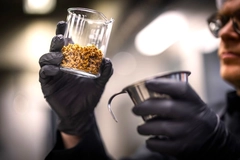
- Industry news
Industry news
- Category news
Category news
- Reports
- Key trends
- Multimedia
- Journal
- Events
- Suppliers
- Home
- Industry news
Industry news
- Category news
Category news
- Reports
- Key trends
- Multimedia
- Events
- Suppliers

14 Nov 2016 --- A campaign to cut consumption of sugary soft drinks in the US state of Maryland has shown positive results with a 20 percent drop in in sales of sodas as a result of the experiment which included policy changes and community education efforts.
In 2012, the Horizon Foundation - an independent non-profit dedicated to improving the health and wellness of people living or working in Howard County, Maryland - kicked off a drive to encourage people to reduce their intake of sugary sodas, sports drinks, energy drinks and fruit drinks.
Three years later the results are in and, according to the American Heart Association, researchers have found that sales of sugar-sweetened soda feel by almost 20 percent by volumes in Howard County, but remained stable in comparison stores.

Sales of fruit flavored drinks with added sugars also fell by 15 percent as did sales of 100 percent fruit juice.
Drinks loaded with added sugars are one of the leading sources of empty calories in the diet of both children and adults, and overconsumption of sugar is associated with obesity and an increased risk of heart disease.
This is the first study to use objective retail sales data to measure the effectiveness of a community led campaign to reduce the consumption of sugary drinks.
“This study shows that a public health campaign combining community-wide education, policy changes and culture-shifting efforts can significantly reduce sugary drink sales,” said Marlene B. Schwartz, Ph.D., Director of the Rudd Center for Food Policy and Obesity at the University of Connecticut. “Through complementary strategies from advocating for changes to child care nutrition standards to creating TV ads, “Howard County Unsweetened” made a concerted effort to encourage families to switch their drinks.”
Researchers compared weekly beverage sales of top-selling brands from 15 supermarkets in Howard County with a matched set of 17 supermarkets in southeastern Pennsylvania, controlling for marketing influences such as product prices. The study did not have sales data from non-supermarket vendors, such as convenience stores, and only included the top selling brands sold rather than all brands sold.
The campaign included a variety of measures including: strengthening the local school system’s wellness policy to eliminate sugary drinks in student-accessible vending machines and at school-day functions, enacting a 2014 state law to ban licensed childcare centers from serving sugary drinks to children in their care; enacting a 2015 local law making healthier food and drink more widely available on local government property and in children’s programming; and convincing almost 50 local community organizations through outreach and education to improve the food and drink choices they offer at meetings and through vending machines.
There were also TV ads, social media campaigns, direct consumer education such as using a marketing team to engage consumers at pools, community events, sports events and health fairs and healthcare professionals gave training to improve patient counseling on the dangers of consuming too many sugary drinks and the diagnosis and treatment of childhood obesity.
The study is funded by the Horizon Foundation, the Robert Wood Johnson Foundation, and the Rudd Foundation.
A spokeperson from the Amercian Beverage Association said: "America's beverage companies are committed to helping people cut the calories and sugar they get from beverages because we too want a healthy America. But tackling obesity requires a holistic approach that looks at the entire diet, not just the 6 percent of calories that comes from beverages."
"America's leading beverage companies are doing the hard work of trying to change behaviors that can lead to obesity. Our latest and most ambitious effort to date - the Balance Calories Initiative - is aimed at driving a reduction in the sugar and calories consumed from beverages across America. By engaging with prominent public health and community organizations we are working to change behavior in communities with some of the highest obesity rates in the country, such as parts of Los Angeles, New York City, Little Rock, the Mississippi Delta and rural Alabama. We're providing the new beverage options, information and encouragement to help people cut back on calories and sugar."












